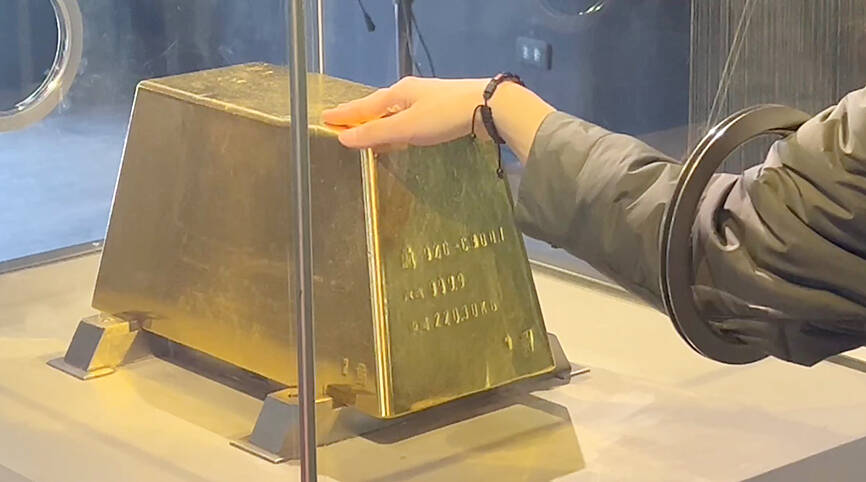The Gold Museum on Saturday said that its 220kg gold brick has risen in value to more than NT$700 million (US$23.33 million), making it the institution’s top exhibit and a key draw for visitors.
The bullion bar has been on loan to the museum in New Taipei City’s Rueifang District (瑞芳) from the central bank since 2004, when its market value was about NT$115 million.
Over the past 21 years, surging gold prices have pushed its value to about NT$718 million, it said.

Photo: Lu Hsien-hsiu, Taipei Times
The large ingot is protected with round-the-clock monitoring, including security guards and digital surveillance, and is enclosed in bulletproof glass. The brick’s protective case has small openings on either side that allow people to touch the gold surface.
Insurance is purchased every year, with premiums climbing in line with international gold prices, the museum said, adding that it could not disclose the exact cost of coverage for security and contractual reasons.
About 180,000 people — mostly Taiwanese — visited the museum from January through last month, it said.
Museum director Lin Wen-chung (林文中) said that Jinguashih (金瓜石) and Jioufen (九份), two neighboring mountain towns, were once considered the best gold mining areas in East Asia.
The brick was once recognized by Guinness World Records as the world’s largest gold brick, but that record was broken in 2005 by a 250kg ingot from the Toi Gold Mine in Izu, Japan.

SHIPS, TRAINS AND AUTOMOBILES: The ministry has announced changes to varied transportation industries taking effect soon, with a number of effects for passengers Beginning next month, the post office is canceling signature upon delivery and written inquiry services for international registered small packets in accordance with the new policy of the Universal Postal Union, the Ministry of Transportation and Communications said yesterday. The new policy does not apply to packets that are to be delivered to China, the ministry said. Senders of international registered small packets would receive a NT$10 rebate on postage if the packets are sent from Jan. 1 to March 31, it added. The ministry said that three other policies are also scheduled to take effect next month. International cruise ship operators

NUMBERS IMBALANCE: More than 4 million Taiwanese have visited China this year, while only about half a million Chinese have visited here Beijing has yet to respond to Taiwan’s requests for negotiation over matters related to the recovery of cross-strait tourism, the Tourism Administration said yesterday. Taiwan’s tourism authority issued the statement after Chinese-language daily the China Times reported yesterday that the government’s policy of banning group tours to China does not stop Taiwanese from visiting the country. As of October, more than 4.2 million had traveled to China this year, exceeding last year. Beijing estimated the number of Taiwanese tourists in China could reach 4.5 million this year. By contrast, only 500,000 Chinese tourists are expected in Taiwan, the report said. The report

The Forestry and Nature Conservation Agency yesterday launched a gift box to market honey “certified by a Formosan black bear” in appreciation of a beekeeper’s amicable interaction with a honey-thieving bear. Beekeeper Chih Ming-chen (池明鎮) in January inspected his bee farm in Hualien County’s Jhuosi Township (卓溪) and found that more than 20 beehives had been destroyed and many hives were eaten, with bear droppings and paw prints near the destroyed hives, the agency said. Chih returned to the farm to move the remaining beehives away that evening when he encountered a Formosan black bear only 20m away, the agency said. The bear

Chinese embassy staffers attempted to interrupt an award ceremony of an international tea competition in France when the organizer introduced Taiwan and displayed the Republic of China flag, a Taiwanese tea farmer said in an interview published today. Hsieh Chung-lin (謝忠霖), chief executive of Juxin Tea Factory from Taichung's Lishan (梨山) area, on Dec. 2 attended the Teas of the World International Contest held at the Peruvian embassy in Paris. Hsieh was awarded a special prize for his Huagang Snow Source Tea by the nonprofit Agency for the Valorization of Agricultural Products (AVPA). During the ceremony, two Chinese embassy staffers in attendance